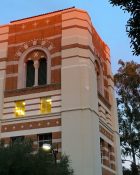
Kartik Raj

Colloquy Editor
Kartik T. Raj completed his undergraduate degree in Philosophy in 2017 and won the Kalish Prize that year. He is currently pursuing a J.D. at UCLA School of Law.
CE: What you have done since you graduated from UCLA?
CE: How did you get interested in philosophy?
A background in analytical philosophy is extremely useful for studying law, and I use many of the skills I learned as an undergraduate all the time in law school.
CE: How do you use your philosophy degree in your current pursuits?
CE: Is there anything about philosophical study that has changed your daily life in some way?
CE: What would you recommend to undergraduates to get the most out of UCLA and their philosophy degree?
First, think carefully about what you want to do with your philosophy degree after graduating. Studying philosophy is intrinsically valuable and can radically alter your life and understanding of the world. However, you’ll hopefully have a life beyond your years as an undergrad at UCLA; thinking ahead for that future will make you much better off. Unless you are absolutely sure that you want to dedicate your life to academic philosophy (trust me, you aren’t as sure as you might think), you should try to keep your professional options open by cultivating practical skills. It’s also important to be involved with organizations and causes that are important to you.
UCLA is a huge community with endless opportunities, so don’t limit yourself to our philosophy department, great as it is.
Also, remember that you can take philosophy classes, have philosophy friends, and learn a great deal about the field without majoring in philosophy. As an undergraduate, I thought I had to major in philosophy in order to learn ‘enough’ about the field. For many reasons, that’s not the case. Minoring in philosophy is a good option too.
If you are truly dedicated to the path of academic philosophy, I’d recommend that you try to specialize in some area or topic that you can focus on to create a strong writing sample for Ph.D. programs. Taking a contract course with a professor interested in the topic is a great way to produce a good writing sample while fulfilling your major requirements.
My most important advice: remember that our world is teeming with preventable injustice and suffering, and that many of us are able to pursue higher education due to our relative good fortune (despite the hardships and disadvantage many of us also face). As students at a leading educational institution in one of the richest nations on Earth, we have a fairly unique opportunity to have a massive positive impact on the world. When deciding how to spend your time as an undergraduate and beyond, consider the kind of impact you want to have on the world and how your chosen career/major does or doesn’t allow you to make that impact. I personally found a lot of insightful career advice from 80,000 Hours, an organization that helps people make impactful career choices. Along with other philosophy students at UCLA, I co-founded a student organization dedicated to discussing the impacts of our choices and our ability to help others, called Effective Altruism at UCLA.

